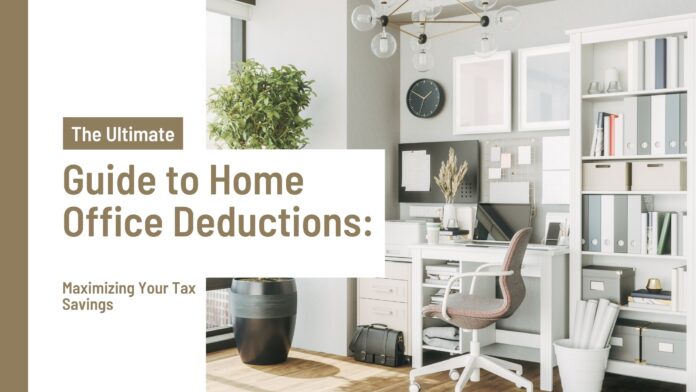Introduction
The COVID-19 pandemic has made working from home a new normal for many individuals worldwide. As a result, home office deductions have become increasingly popular as a tax-saving strategy, especially for small business owners and self-employed individuals. Home office deductions allow taxpayers to deduct expenses related to the portion of their home used exclusively for business purposes.
This article will discuss the benefits of home office deductions, how to qualify for them, calculate them, common mistakes to avoid when claiming them, documentation and record-keeping requirements, and other related deductions. Let’s dive in!
Small Business owners can benefit greatly from home office deductions as they allow them to reduce their taxable income, which can result in lower taxes paid at the end of the year. Home office deductions also benefit self-employed individuals who may not have access to traditional employer-provided benefits.
One of the factors that can impact eligibility for home office deductions is tax brackets. Tax brackets determine which percentage of an individual’s income will be taxed by the federal government.
The percentage increases as an individual’s income rises. Home office deductions can help reduce taxable income, moving taxpayers into a lower tax bracket, thereby reducing their overall tax liability.
It is important to note that not all homeowners are eligible for home office deductions. Specific criteria must be met to qualify, which we will discuss in detail later in this article.
If you work from home as a small business owner or a self-employed individual and meet the eligibility requirements outlined by the IRS, you can take advantage of home office deductions as a tax-saving strategy. The next sections will provide more details on how this works and what you need to do to claim these valuable deductions.

Understanding Home Office Deductions
If you’re someone who conducts business from a home office, you may be eligible for tax deductions.
In a nutshell, home office deductions allow individuals to deduct certain expenses related to their home office on their tax returns. The IRS defines a home office as a space used “regularly and exclusively” for business purposes.
It’s important to note that the area doesn’t have to be an entire room; it can also be a portion of a room that is designated specifically for work. There are two types of expenses that can be deducted: direct and indirect.
Direct expenses are costs incurred solely for the home office, such as painting or repairs in a specific area. Indirect expenses are those that relate to the entire house but are allocated based on the percentage of square footage used for business purposes.
Small business owners and self-employed individuals who work from home may find these deductions especially helpful in lowering their taxable income. It’s important to note, however, that there are specific criteria one must meet in order to qualify for these deductions at tax time.
Tax brackets will also play an important role in how much one is able to save through these deductions. Those in higher tax brackets will see more significant savings than those with lower incomes.
Benefits of Home Office Deductions
One of the most significant benefits of home office deductions is that they can significantly reduce your tax liability. By deducting expenses related to your home office, you can lower your taxable income and reduce the amount of tax you owe.
This is especially helpful for those in higher tax brackets, as the savings can be substantial. Another benefit of home office deductions is that they can be a valuable tax-saving strategy for small business owners.
Self-employed individuals who use their home as their primary place of business may be eligible to claim expenses like utilities, rent or mortgage interest, property taxes, and insurance premiums as deductions on their taxes. This can help these individuals save thousands of dollars yearly on their taxes.
In addition to saving money on taxes, claiming home office deductions may also increase the value of your property by making it more attractive to potential buyers. If you are planning on selling your home in the future, having a designated area for a home office or workspace may make your property more desirable to buyers who work from home or run a small business.
Overall, there are many benefits to claiming home office deductions as a tax-saving strategy. By lowering your taxable income and reducing your tax liability while potentially increasing the value of your property, this deduction can make a significant impact on your financial situation, whether you are self-employed or an employee working from home.

How to Qualify for Home Office Deductions
To qualify for home office deductions, you need to meet specific criteria outlined by the IRS. First and foremost, the space you are claiming must be used exclusively for business purposes.
This means that it cannot double as a personal space or be used for any other purpose except your small business operations. The second requirement is that your home office should be your principal place of business.
In other words, you must not have an office outside of your home where you conduct most of your work activities. Another crucial qualification criterion is that your home office should be regularly and exclusively used for administrative or managerial tasks related to your small business operation.
In addition to exclusivity and regular use, the IRS requires that you use the designated space in a systematized manner and on a continuous basis. You must also show that conducting work from home provides a significant benefit to your small business.
It’s also essential to note that qualifying for home office deductions doesn’t necessarily mean you’ll get them. You will still need to separate deductible expenses from non-deductible ones and determine the proper amount of deductions based on factors such as tax brackets and income levels.
Calculating Home Office Deductions
To calculate your home office deductions, you must first determine the percentage of your home that is used for business purposes. This includes the square footage of your office space in relation to the total square footage of your home.
For example, if your office space is 200 square feet and your home is 2,000 square feet, then your office takes up 10% of your home. Once you have determined the percentage of business use, you can apply this percentage to various expenses related to maintaining and running your home.
This includes mortgage interest, property taxes, utilities such as electricity and internet, repairs and maintenance costs. Small Business owners can also deduct depreciation on their homes in proportion to their business use.
Taxpayers can choose between two methods for calculating depreciation: the simplified method or actual expense method. It is important to note that there are limits on how much you can deduct when it comes to certain expenses such as mortgage interest and property taxes.
Additionally, if your total expenses exceed your self-employment income or small business income for the year, then you may not be able to claim a deduction for all of these expenses in that tax year. It’s important to determine which tax bracket you fall under when calculating these deductions since higher-income individuals may be subject to additional limitations on certain deductions based on their income levels.
Common Mistakes to Avoid When Claiming Home Office Deductions
One of the biggest advantages of claiming home office deductions is reducing your tax liability. However, making mistakes when claiming these deductions can lead to penalties and increase your audit risk.
Here are some common mistakes to avoid when claiming home office deductions. Firstly, failing to understand the requirements for home office deductions can be a costly mistake.
The IRS has specific rules regarding what qualifies as a home office, and not meeting those requirements can result in disallowance of deductions or even an audit. Make sure you familiarize yourself with the requirements before claiming any deductions.
Secondly, one should avoid overestimating the size of their home office and related expenses. While it may be tempting to claim the maximum amount possible for tax savings purposes, doing so can raise red flags with the IRS and increase your chances of an audit.
Make sure that you have accurately estimated the percentage of your home used for business purposes and have supporting documentation to back it up. Thirdly, failing to update old expense calculations can also lead to errors in calculating your deduction amounts.
For example, if you used a standard calculation method last year but switched to actual expenses this year without updating previous years’ calculations will lead to confusion in future years. Small business owners should avoid mixing personal and business expenses when claiming home office deductions on their taxes.
Inadvertently adding personal expenses into business-related claims can result in disallowance or incorrect calculations which may end up pushing them into higher tax brackets than they would belong in otherwise. Overall, understanding how to calculate and claim these deductible expenses correctly is important for reducing tax liability without raising unnecessary red flags or increasing audit risk.

Documentation and Record Keeping for Home Office Deductions
To claim home office deductions, it’s essential to have proper documentation and record-keeping. This is because the IRS may audit your tax returns at any time to verify that you are eligible for the deductions claimed.
Here are some key considerations in terms of documentation and record-keeping for home office deductions. Firstly, it’s essential to maintain accurate records of all expenses related to your home office, including receipts, invoices, bills, and bank statements.
This documentation should cover all expenses related to operating your home office, such as rent or mortgage interest payments, utilities (electricity, gas), internet and telephone charges. Secondly, it’s crucial to maintain a detailed log of the time you spend using your home office exclusively for business purposes.
You should keep a record of the hours spent on specific tasks or projects in a diary or calendar format. This way, you can track how much time you spend on business activities versus personal activities.
Thirdly, if you’re using part of your home as an office space for a small business that pays employees or contractors (including yourself), maintaining proper payroll records is crucial. These records should include detailed information about each employee’s pay and benefits package – including sick leave pay as well as medical benefits premium payments – along with proof of employment taxes paid on their behalf.
If claiming depreciation deductions on assets used in the home office such as computers or furniture; capital gains tax rules apply when selling these assets after claiming depreciation over several years. ; Documentation and Record Keeping are vital when claiming Home Office Deductions.
Make sure all records are accurate and updated since this can have significant impacts in case there is an IRS audit. Proper documentation is also essential when calculating taxable income since this could place individuals into higher tax brackets if not appropriately handled.
Home Office Deductions for Self-Employed vs Employees
When it comes to home office deductions, there are some differences between self-employed individuals and employees. The IRS has specific guidelines for who can qualify for home office deductions and how much they can deduct.
Understanding the differences between these two groups is crucial in maximizing your tax savings. The Tax Cuts and Jobs Act of 2017 eliminated home office deductions for employees through 2025. Employees can ask their employers about implementing an accountable reimbursement plan to get reimbursed for the use of their home office for work purposes. This reimbursement would be a deduction to the employer and tax-free to the employee.
Self-employed individuals can deduct their home office expenses as a business expense on Schedule C of their tax return. This means that they can deduct a percentage of their rent or mortgage interest, property taxes, utilities, and other expenses that directly relate to their business use of the home. The percentage used to calculate the deduction is based on the size of the home office compared to the overall size of the home.
Overall, understanding how different rules apply to self-employed individuals versus employees when it comes to claiming a deduction for your home office is key in optimizing your tax savings potential as a small business owner or remote worker.
Other Related Deductions
Small Business owners who use their home as an office may also be eligible for other related deductions. If you use your vehicle for business purposes, you may be able to deduct expenses such as gas, maintenance, and repairs.
As with the home office deduction, the vehicle must be used primarily for business purposes. Small business owners can also receive deductions for the depreciation of assets such as computers or office furniture.
The IRS allows businesses to write off these items through Section 179 of the tax code which allows small businesses to immediately expense up to $1 million of equipment purchases in a single year. Additionally, if you hire employees to work in your home office or elsewhere in your small business, you may qualify for certain deductions related to payroll taxes and employee benefits.
For example, if you pay health insurance premiums on behalf of your employees, this expense can be deducted from your taxable income. Similarly, contributions made to retirement plans on behalf of employees can provide a tax deduction for eligible businesses.
It is important to note that the eligibility and rules associated with these other related deductions vary based on individual circumstances and can depend on factors such as tax brackets and filing status. It is recommended that small business owners work with an experienced accountant or tax professional when navigating these complex regulations and determining eligibility for various deductions.

Impact of Home Office Deductions on Home Sales
One of the most significant impacts of claiming home office deductions is that it can affect the value of your home when you decide to sell it. The amount of depreciation claimed on your home office can reduce your basis in the property and, in turn, increase your capital gains tax liability when you sell. For example, suppose you claim $5,000 in depreciation on a $250,000 house over five years.
In that case, the IRS considers that you have reduced your cost basis by $5,000. Suppose you then sell your home for $350,000.
You will owe capital gains tax not only on the profit made ($100,000), but also on the depreciation taken ($5,000). This depreciation recapture is taxed at a maximum rate of 25%, regardless of your tax bracket.
However, this does not mean that all homeowners should avoid claiming home office deductions altogether. Small business owners who use a portion of their homes exclusively for business purposes may be able to claim more significant deductions than what they would owe in additional taxes when selling their homes.
It is vital to understand how claiming home office deductions may impact your future plans before making any decisions or filing any claims. Consult with a tax professional or real estate agent for guidance and advice as needed.
Future of Home Office Deductions
As the workforce becomes more mobile and the number of home-based businesses continues to grow, the future of home office deductions is likely to remain an important tax strategy. However, there are some potential changes that may arise in the years ahead.
One possible change relates to the increasing popularity of co-working spaces. As small business owners seek out affordable workspace solutions, many are turning to shared office spaces that allow them to split rent costs while still having a dedicated workspace outside of their homes.
If this trend continues, it could lead to a decrease in the number of taxpayers who qualify for home office deductions. Another potential change could come from changes in tax brackets or laws surrounding employee expenses.
With recent tax reform efforts focusing on simplifying taxes and eliminating certain deductions, it’s possible that home office deductions may be scaled back or eliminated altogether in the future. Despite these uncertainties, home office deductions are likely here to stay for at least the near future.
As more people work from home either as self-employed individuals or as remote employees, these deductions will remain an important tax-saving strategy for those who qualify. Taxpayers should stay informed about any potential changes so that they can make informed decisions about their filing strategies going forward.
Conclusion
Home office deductions can be a valuable tax-saving strategy for both self-employed individuals and employees who work remotely from home. However, it is important to ensure that you meet all the necessary requirements and documentation to claim this deduction accurately.
Keep track of your expenses and record them diligently, consult with a tax professional if needed, and avoid common mistakes such as claiming more space than you actually use or claiming expenses not related to your business or job. Overall, taking advantage of home office deductions can have a significant impact on your overall tax liability and can help you move into lower tax brackets.
Small businesses can particularly benefit from this deduction as it may increase their profitability by reducing their taxable income. As more people continue to work remotely, the IRS may also provide more guidance on home office deductions in the future.
So keep an eye out for any updates that may affect your eligibility for this deduction. If you are eligible for home office deductions, be sure to take advantage of this valuable tax-saving opportunity to reduce your taxable income and potentially increase your refund or lower your overall tax bill.
Unearthed the potential of Hiring Children & Grandchildren as a tax strategy yet? Dive deeper into our wealth of articles that demystify this effective strategy and its implications. Let us guide you through the labyrinth of tax laws, generating curiosity and sparking knowledge that can truly benefit your family’s financial future.










